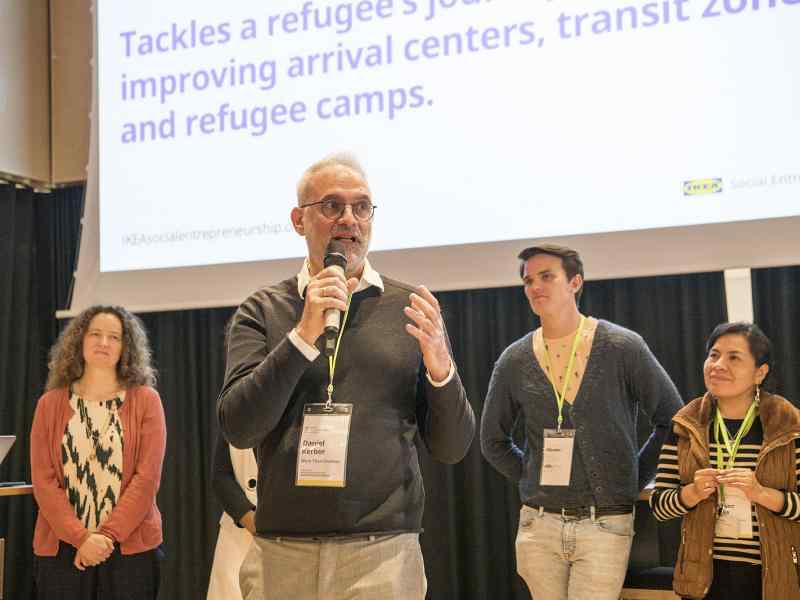Introduction
Nani Zulminarni is reversing the pattern of discrimination against women who head their households by educating and enabling them to generate resources to provide for their families and raise their position in the community. She also educates the public on the critical role these women can play in society.
The New Idea
Nani helps women who head their households—widows, divorcees, those who have been abandoned by their husbands, those whose husbands are disabled or ill, and single women—to recognize themselves as capable of making important contributions to society, both as individuals and collectively. She has set up women’s groups around Indonesia that allow women to connect with one another while strengthening their economic outlook and gaining self-confidence. She starts with economic empowerment programs that focus on small businesses and personal savings and loans.
Nani also addresses societal perceptions of women heads of households by raising awareness about their problems and by helping them to create new roles for themselves. Women in her program have gone on to become leaders in their communities. In West Java, participants in Nani’s program have inspired motorcycle taxi drivers to join their activities while teaching them about domestic abuse prevention. In conflict-ridden areas such as North Maluku, they have pioneered peace education. In a province in eastern Indonesia, for example, a single mother won her campaign to be the head of her village. Others from the same area have successfully advocated for changes in local budgets to accommodate women-headed households. At the national level, Nani is working to change discriminatory laws and policies.
The Problem
The problems women heads of households face are rooted in Indonesian social values, and legitimized by the state in the form of discriminatory laws and regulations. There are around 6.5 million women heads of households in Indonesia, who provide for a total of around 30 million people. Despite their growing numbers—they accounted for 13 percent of Indonesian households in 2000 and 16 percent in 2005—their existence has yet to be socially or legally recognized. In reality, they financially support their families, make decisions, raise children, and are accountable for all family members. Nonetheless, they have no official legal standing.
Households headed by women are more likely to suffer from gender discrimination, an absence of social support, and poverty. Thirty nine million Indonesians live in poverty and women are among the poorest of the poor. They are disadvantaged relative to men in their access to assets, credit, employment, and education. Consequently, female-headed households are generally poorer than male-headed households.
Indonesia’s family governance system derives from its patriarchal culture. The state has institutionalized the division of labor and power within the family. Marriage laws clearly state that the husband is the head of the household and the wife is the housewife. The implication of this law has resulted in greater gender discrimination and thus perpetuates imbalances between women-headed households and the rest of the society.
The problems women household heads in Indonesia face have generally been neglected. Indonesia, with its strong cultural norms of marriage and patriarchy, only recognizes women left single by divorce or death. Women-headed households that fall outside these categories whether because of abandonment, illness, or choice, suffer from discrimination, stigma, and second-class citizenship. Many women in this group feel inferior and are afraid to go out in public. Programs for poor women heads of household are often either charitable in nature or limited to income generating activities. None empower women to change their social status, let alone their legal status.
The Strategy
Nani aims to help women heads of households become socially visible and politically empowered so they can act as agents of change in their own lives. In 2002 she began to organize women, starting with a program of savings and loans, which served as an entry point because it answered basic daily financial needs. To Nani, it was important for these women to realize that despite their poverty, they could put money aside for savings. The women begin with a savings group, which allows them to pool money taken from their own daily budgets. After a six-month saving period, they become eligible to take out loans. When the groups are able to manage their own money, Nani helps them access other organizations that grant seed money. Nani also helps the women build their skills by offering small business development and leadership training. In addition to their financial activities, groups of about fifty women meet weekly to share their personal problems and support one another.
Nani is building a nationwide organization, the Program for Women Headed Households in Indonesia (PEKKA). The name PEKKA is both an abbreviation and a word meaning “sensitive.” Many of the women involved with her organization proudly identify themselves as “pekka,” and this identification serves as a tool for advocacy. In addition to creating a strong sense of identity among members, Nani believes that to build a mass movement, the underlying organization must be robust and based on a strong network. PEKKA now consists of 404 women’s groups organized both in villages and on the provincial level. The collective power of these women’s groups is impressive; in West Java alone, savings and loans groups have created a cash fund over 5 billion rupiahs, and in East Nusa Tenggara, women in PEKKA voted as a bloc in a regional election and contributed 20 percent of the votes. Nani believes that to foster positive attitudes towards women heads of households, these women must be seen as leaders in addressing their communities’ problems. So she encourages participants to work on issues directly related to their daily lives and the daily lives of their neighbors. PEKKA members have addressed healthcare, composting, slash and burn cultivation practices, and high education fees, all problems of concern not only to women’s groups but to society as a whole. Nani’s approach is inclusive and her activities are open to men, in part because she realizes that changing men’s attitudes is essential. With that in mind, a women’s group in Subang, West Java, offers classes on electronics for young men and women in the group teach male motorcycle taxi drivers about savings and loans. Their training sessions give the women an opportunity to talk about domestic violence and how to prevent it, a topic that alone would not attract an audience.
In five years, Nani’s women’s groups have spread from 20 to 283 villages in fifty-seven sub districts. Around 1,000 women leaders trained by PEKKA have reached more than 10,000 women heads of households across eight of Indonesia’s provinces. In support of her efforts, Nani is developing a public campaign to raise awareness of the issues facing women heads of households using movies, art, cultural performances, religious preaching, and photo exhibitions. Looking ahead, Nani is working on having her model replicated by the Women’s Empowerment Ministry, other citizen organizations, and local governments.
The Person
Nani was born in Pontianak, Kalimantan as the second of ten siblings. She first learned about gender imbalance within her family. Her father was a paternalistic figure upon whom her mother was financially dependent. Her mother could not say no to her husband, who compelled her to continue having children. This situation prompted Nani to become independent at an unusually young age. She arranged her own junior high school education and earned several scholarships. She attended the Agriculture Institute of Bogor, even though she wanted to become a doctor.
In the early 1980s, when she was at the university, Nani became a student activist. She and other students taught in poor communities and mosques. In her second year of university, she decided to marry one of her activist friends to avoid her family’s concern over her involvement in off-campus activities. The marriage was a sham, undertaken to serve Islamic law while Nani continued her social activism. In 1982, she joined a student’s movement that promoted wearing veils in public schools and offices during a time when it was not allowed. After finishing her studies in 1985, she looked for a job and encountered discrimination, so she began work in the garment business of her friend and as a high school teacher to earn a living. She credits her mother with teaching her perseverance.
In 1987, she found a job with a citizen organization, The Centre for Women’s Resource Development. As a field worker, she organized poor rural women and promoted income generating activities. Later, she learned that through small microfinance projects she could raise and discuss the issues that had marginalized poor women. She started a literacy program after learning that men often deceived their illiterate wives, for example by asking the women to sign agreements allowing them to take a second wife. Eventually, Nani took two years off from her job when she received a scholarship to study sociology, gender, and development in the U.S. When she returned to Indonesia in 1993 she transformed her organization, changing its strategic direction from community development to community organizing, which she believes is less restrictive and leads to long-term solutions.
In 1998 Nani and her husband separated and officially divorced in 2000. As a divorcee she often faced discrimination and stereotyping. She was moved by the struggle of divorced women living in a society that discriminates based on marital status. That is why, in 2000, when asked by the National Commission on Violence Against Women to run a single married women’s project, she shifted the focus of the project to empower poor women heads of households. Two years later she began directing the program; now a separate organization, PEKKA.
 Tile image
Tile image


